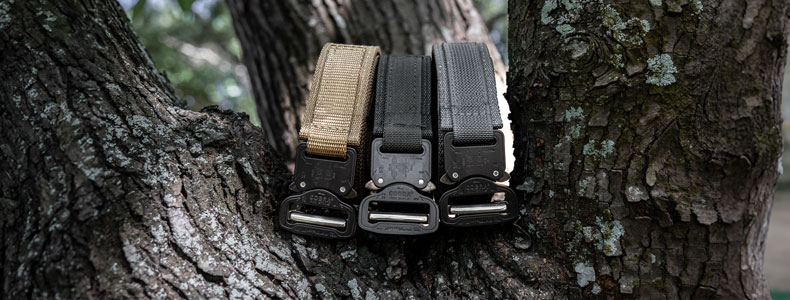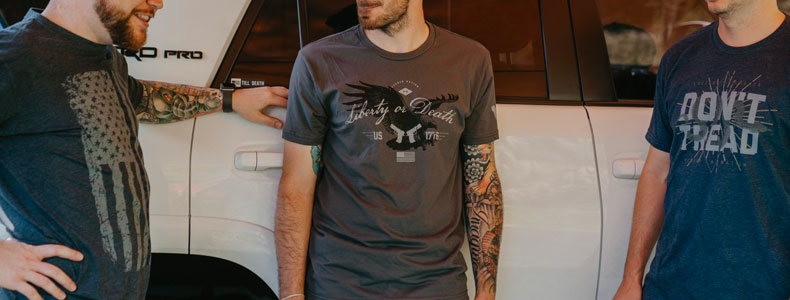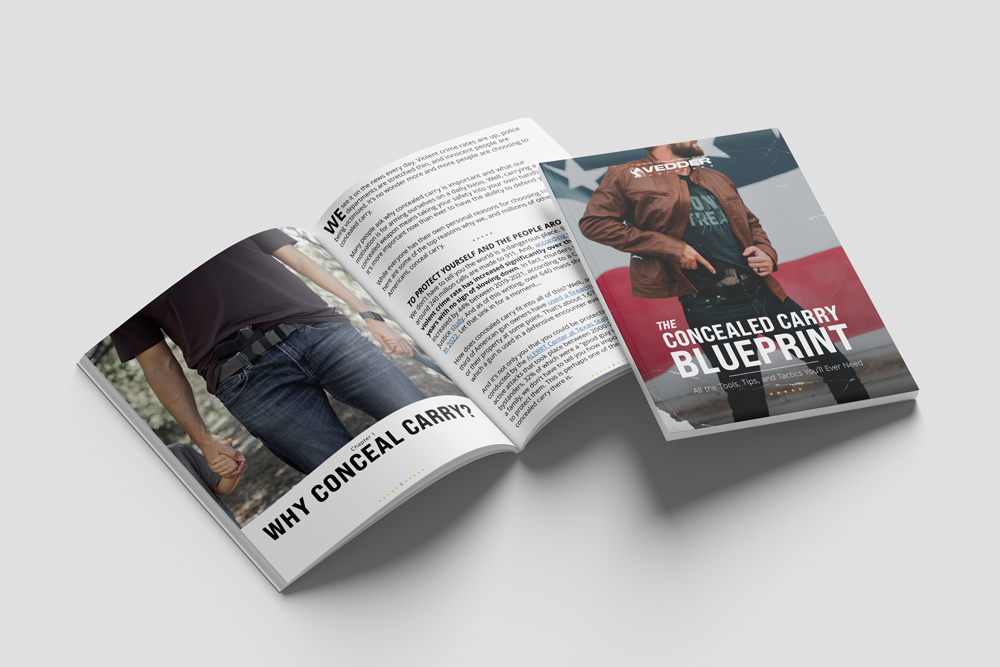Dressing for Concealed Carry: The Ultimate Guide

Concealed carry is a decision that affects every aspect of your lifestyle – including how you dress.
When most people first start carrying a gun, they find that dressing is one of the biggest adjustments they have to make. After all, you’re no longer just looking for clothes that fit your body, but ones that can hide a chunky piece of metal as well.
So, how should you dress for concealed carry?
While not overly complicated, dressing for concealed carry does require a bit of strategic thinking. Even though you don’t need specialty tactical garments to conceal your gun, you do need to choose clothes that make it easy to access your weapon and hide it without printing.
Luckily, you don’t have to completely revamp your wardrobe to successfully conceal a firearm. Keep reading to learn about the factors you should consider when choosing concealed carry clothes, as well as some tips for selecting clothes that work.
Products Mentioned In This Article
Factors to Consider
Accessibility
Many people focus all their attention on making sure their gun is invisible to the rest of the world when selecting clothes for concealed carry. While that is important, of course, it shouldn’t actually be your main focus.
Being able to quickly and safely access your firearm should be your NUMBER ONE priority when dressing for concealed carry.
After all, if you can’t get to your gun in time to stop an attacker, what’s the point?
When choosing garments for concealment, look for shirts and jackets that can be easily swept aside or pulled up by your weak hand, completely revealing your firearm. That means nothing so tight that you’ll struggle to move it, or anything that will get hung up on your pistol’s grip.
Also, while extra layers and loose fabrics can do wonders in terms of concealment, they can also be difficult to clear. If you have to grab more than one handful of fabric to expose your gun, it’s too much.
The best way to determine whether your clothing leaves your weapon accessible is to try it on and practice clearing the garment and drawing your weapon. If you find you’re struggling to do so, or it’s taking you longer than it should, wear something else!

Printing
While it shouldn’t be your main focus, printing is a factor to consider when choosing clothes for concealed carry.
Gun printing is a phenomenon that occurs when the bulge or outline of your pistol can be seen through your clothing. This often happens when your shirt is too light, too tight, or too thin. It can also happen when you bend over, walk, or move in a way that stretches the fabric over your gun.
While some folks are not bothered by a little bit of printing, it can be uncomfortable for a lot of people, especially those who are new to concealed carry. If this is something you’re concerned about, you’ll have to take extra precautions to prevent it.
That being said, the ability to clear your cover garment is more important than having zero printing. So, while a few extra layers might solve the printing issue, it can also make it harder to access your gun in an emergency, which should be a priority. So be mindful of that when getting dressed.
To read more about the issue of gun printing, check out our article: “ Does Concealed Carry Printing Matter?”
Carry Position
The carry position you choose has a lot to do with the type of clothing needed for concealed carry.
If you’re carrying inside the waistband (IWB), you’ll find that you can conceal wearing almost anything while carrying outside the waistband (OWB) requires a cover garment to hide a gun.
Neither method is harder to dress for, necessarily, but they do require an entirely different approach. If you find you’re struggling to dress for one or the other, try mixing it up to see if your wardrobe is more compatible.
Climate
The season and climate where you have has a major impact on your concealed carry clothing options.
If you live in a warm environment, for example, you may find it difficult to conceal outside the waistband without experiencing heat stroke from the layers you have to wear.
On the flip side, if you live in a cold climate, you’ll need to be strategic with the types of sweaters and jackets you wear as you still want your pistol to be accessible.
You may also discover that many of the lighter materials typically worn in the summer are not as good at concealing a pistol as the thicker, heavier garments worn in winter. While all of these things can be worked around, they are something to think about as you shop for concealed carry clothes.
For more tips on how to specifically conceal carry in the winter and summer, check out the linked blog articles!
Style
We’ve said it already but we’ll say it again: you do not need to sacrifice your personal style for the sake of concealed carrying.
Some people buy a gun and immediately head out to buy brand-new new tactical clothing complete with an overwhelming amount of straps and pockets. If this is what you want to wear, great! If you prefer to dress another way, however, there’s no need to stop.
A good concealed carry outfit consists of anything that successfully hides your gun while leaving it accessible. That’s it. So, whether you typically wear business casual, jeans and a T-shirt, or even sundresses and tank tops, that is concealed carry clothing as long as there’s a gun underneath it.

What to Wear for Concealed Carry
The good news is that you likely won’t need to run out and buy an entirely different wardrobe. Most of what you need to conceal carry is probably already in your closet – you may just have to piece it together in a more deliberate way.
At the end of the day, the exact things you will need to wear for concealed carry will depend on the type of holster you’re using, your body type, and where you plan to carry.
So, while a lot of it simply comes down to trying things until they work for you, here are the basics of what to wear to successfully conceal your gun.
Shirt
The type of shirt you wear has a major impact on how well you’ll be able to conceal a weapon.
When carrying IWB, you’d be surprised by how well you can conceal with the right holster – even in tighter-fitting shirts. That being said, some tops work better than others.
First, shirts made with heavier materials tend to be better for concealed carry as they typically print less. While some people can conceal under tight clothes, most find it easier to wear a looser-fitting shirt.
While many people find they can successfully conceal carry with a simple T-shirt and jeans, it doesn’t work for everybody. If you find yourself struggling with printing under your normal clothing, try wearing shirts with embellishments like buttons, patterns, or other distracting features to draw the eye away from your gun.
Finally, if you find that no matter what you wear, your shirt is clinging around your firearm and printing, try adding an undershirt to your outfit. The added layer of fabric between your gun and shirt can smooth things over and make a dramatic difference in terms of printing.
Pants
Perhaps the easiest part of dressing for concealed carry is choosing the right pants.
As a general rule, as long as your pants have belt loops, you can easily carry IWB or OWB. That being said, there are a few specific things to look out for.
First, not all belt loops are suited for concealed carry. Some pants, particularly women’s, do not have standard-sized loops. While that’s all fine and dandy, you may not be able to fit your gun belt through these loops, leaving you with nothing to clip your holster to.
Next, if you’re carrying IWB, you may have to wear a pant size up in order to fit your gun. If your pants are tight, you won’t be able to squeeze the pistol between your body and waistband. As a general rule, try to wear pants that are one size up from what you normally wear – or at least large enough that you can fit two fingers inside your waistband.

Dress Clothes
Whether you’re heading to a wedding or just another day at the office, you may be wondering how to conceal carry in a suit or dress.
Luckily, carrying in a suit or dress slacks is easy, so long as the belt loops can fit a standard 1.5” gun belt. Some dress clothes tend to have smaller belt loops than average, so that is something to look out for, but otherwise, it’s the same as carrying in jeans. Plus, you already have the advantage of a button-up and a jacket, so printing should be a non-issue.
If you do plan to conceal carry in dress clothes, you will need a tuckable holster. A tuckable holster is one that allows you to tuck your shirt in over the holster, with the clip attached to your belt.
Because your holster clip will be visible with your shirt tucked, you’ll also want to look for one that’s low-profile and unbranded so that others won’t notice you’re carrying. Luckily, all of our IWB holsters at Vedder Holsters are tuckable, and our Rock Solid Spring Steel Belt Clip is thin, sleek, and unmarked, so your CCW remains discrete.
When it comes to dresses and skirts, things get a little tricky.
Skirts with belt loops are the obvious answer when it comes to carrying IWB or OWB, but if you’re wearing a dress or other type of skirt, things get more complicated.
The bottom line is, you won’t be able to carry on the waistband if you don’t, well, have a waistband to use. So, you may have to opt for a different holster like a belly band, thigh holster, or bra holster.
Once you have the appropriate holster, you’ll still want to stick with looser, flowing dresses and skirts to help keep things concealed.
Cover Garment
Wearing a cover garment, like a jacket, vest, or flannel, is not only essential when concealing OWB, but can be helpful when carrying IWB, too.
If you’re struggling with printing, a cover garment is the answer to your problems. Wearing a loose-fitting item over your normal shirt can hide your gun, spare mags, knife, and whatever else you want to carry with no effort at all!
While this is a really easy solution in colder climates, you can use this method in warmer places, too. Light, button-up tops like Hawaiian shirts, vests, and fishing shirts can all do the trick.
The main thing to consider when utilizing a cover garment is the issue of drawing. While this added layer aids in concealment, it is also one more thing to clear if you need to access your weapon. The key is to practice drawing with your cover garment on to get used to the motion so that when danger strikes, you’re not scrambling to get your jacket out of the way.
Another factor worth noting is that if you are carrying OWB in the winter and using a jacket of some sort to conceal your gun, you can’t take that jacket off – even if you go inside. While this shouldn’t deter you from carrying this way, it is something to think about before you head out for the day.
Gun Belt
One of the best secrets for successfully concealing a firearm is a high-quality gun belt.
Unlike regular belts, which tend to bend and shift under the weight of a pistol and holster, a gun belt is stiffer and more durable, creating a strong foundation for your carry system.
Needless to say, this makes concealing a firearm a lot easier, as everything stays firmly in place without sagging. This can not only make it easier to hide under your clothing but also makes for a more comfortable experience.
But, not all belts are created equal. If you’re looking for a quality gun belt, Vedder Holsters’ selection includes a Leather Gun Belt, a Polymer Core Leather Gun Belt, a low-profile tactical V3 Gun Belt, and a Cobra® Quick Release Gun Belt, all of which are made in America and backed by a lifetime guarantee.

Dress for Success: Concealed Carry Clothing Tips
Beyond the basics, here are a few tricks to make concealing your firearm easier.
Wear Prints and Patterns
One tried and true trick for concealing a gun is to wear clothing with prints, patterns, or dark colors to help prevent printing.
Very dark colors and patterns like plaid, stripes, or camo all go a long way in hiding the outline of your gun by making the shadow of your pistol much harder to see.
This is an especially helpful trick if you tend to wear tighter-fitting clothes, which are bound to print at least a little bit.
Divert Attention
It can be really hard to avoid printing altogether sometimes. Even though most people aren’t looking hard enough to tell that you have a gun, it doesn’t hurt to divert their attention for your own peace of mind.
The idea here is to wear something that will distract people enough that they’ll fail to notice your gun. Jewelry, scarves, hats, and bold shirts can all get the job done. And the best part is, it doesn’t need to be flashy to draw someone’s attention, it just needs to be more interesting than your waistline.
Train in Whatever You Wear
At the end of the day, what you wear is not nearly as important as how functional it is.
No matter what clothing choices you make for concealed carry, training in those garments is a critical part of it.
Different clothing may require different movements to get it out of the way so you can access your gun. So, whenever you add a new garment to your concealed carry wardrobe, practice clearing it with your weak hand and drawing.
This will reveal any potential issues with the item of clothing so that you can work out the kinks before you need your gun.
What About Concealment Clothing?
You may have seen concealment clothing advertised online: everything from tank tops, to leggings, to gym shorts have been designed to carry a CCW.
These concealment clothing items look like a convenient way to carry, but how effective are they, really?
While some of these items can be useful, others are not only ineffective but also unsafe.
Because most of these clothing items are designed with pistol-sized pockets, they’re lacking a proper trigger guard and retention, which risks your gun falling out when you bend over, or worse, an accidental discharge.
If you are going to shop for concealment clothing, make sure to choose something that will hold your weapon securely in place and completely covers the trigger. Or better yet, stick to your tried and true gun belt and holster. It’s a much safer option.

Should I Use a Purse or Backpack for Concealed Carry?
Creating a wardrobe that conceals your pistol is intentional, and requires a bit of forethought. For some, this makes the idea of off-body carry sound rather enticing.
Carrying your gun in a purse, backpack, briefcase, or other bag is a popular and convenient method. However, there are a few important things to consider if you plan to carry this way.
First, drawing a gun from a bag is a LOT slower than from your waistband. When seconds count, this could mean the difference between life and death. Even if you practice drawing from your bag every day, it will never match the speed of drawing from an on-body position.
Carrying your gun off your body also makes it more accessible to unauthorized users. Whether that’s your child, a friend, or a purse snatcher, when your gun is not secured to your body, it is vulnerable.
That being said, sometimes carrying a gun off-body is better than not carrying at all, and there are certainly situations in which this means of carry is warranted. If you are going to do so, however, practicing your draw is essential, and you must keep your bag with you at all times.
For a deeper dive into this method of carry, check out our article: “ Off Body Carry: Pros and Cons.”
Summary
The most important part of dressing for concealed carry is being able to access your gun. Beyond that, all you need to look for is clothing items that feel comfortable and keep your gun from “printing” through.
Choosing the right sized pants, investing in a quality gun belt, wearing prints and patterns, and incorporating a cover garment into your outfit can all help successfully conceal your weapon without jeopardizing your personal style.
A proper gun holster is a major factor in successfully concealing a weapon. If you’re looking for a new IWB, OWB, or pocket carry holster, visit our Holsters by Gun Model page for Kydex holsters that are custom-made for your weapon of choice.
Interested in items beyond holsters? Check out our Resources Page for links to recommended products like lights, lasers, first aid, maintenance, and more, and browse our selection of apparel, and accessories at our website, vedderholsters.com.
To stay up-to-date on all the latest Vedder Holsters content and offerings, check out our blog and follow us on Facebook, Instagram, and Twitter. And be sure to visit our sister company, GeoGrit, for all of your American-made minimalist wallet needs.




